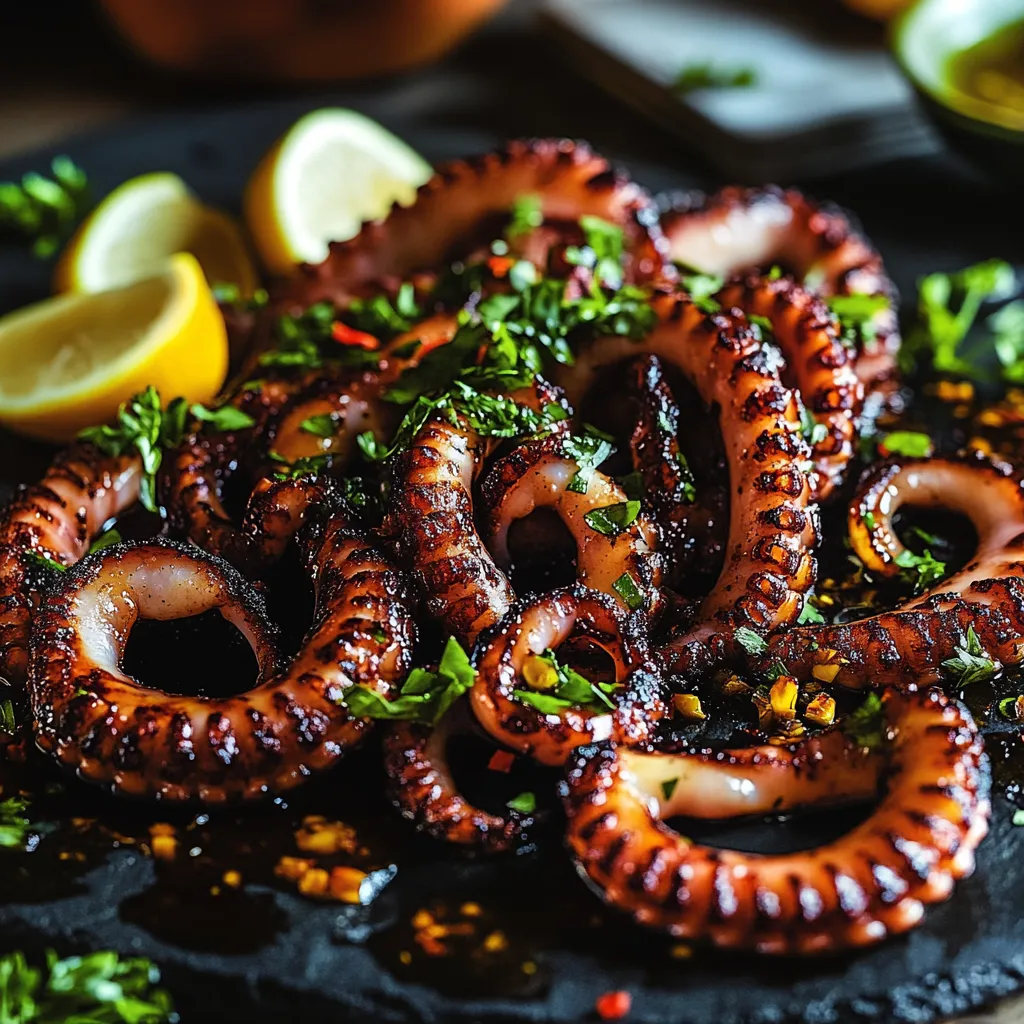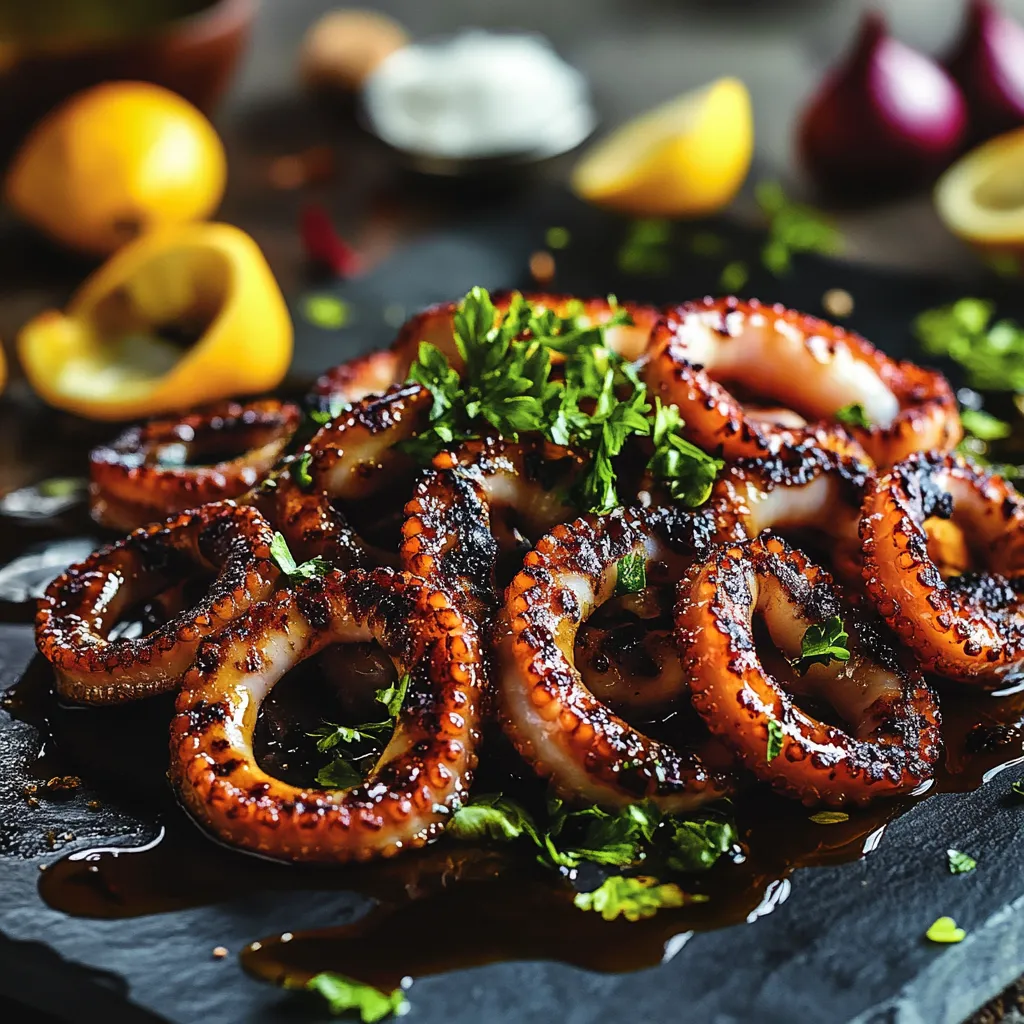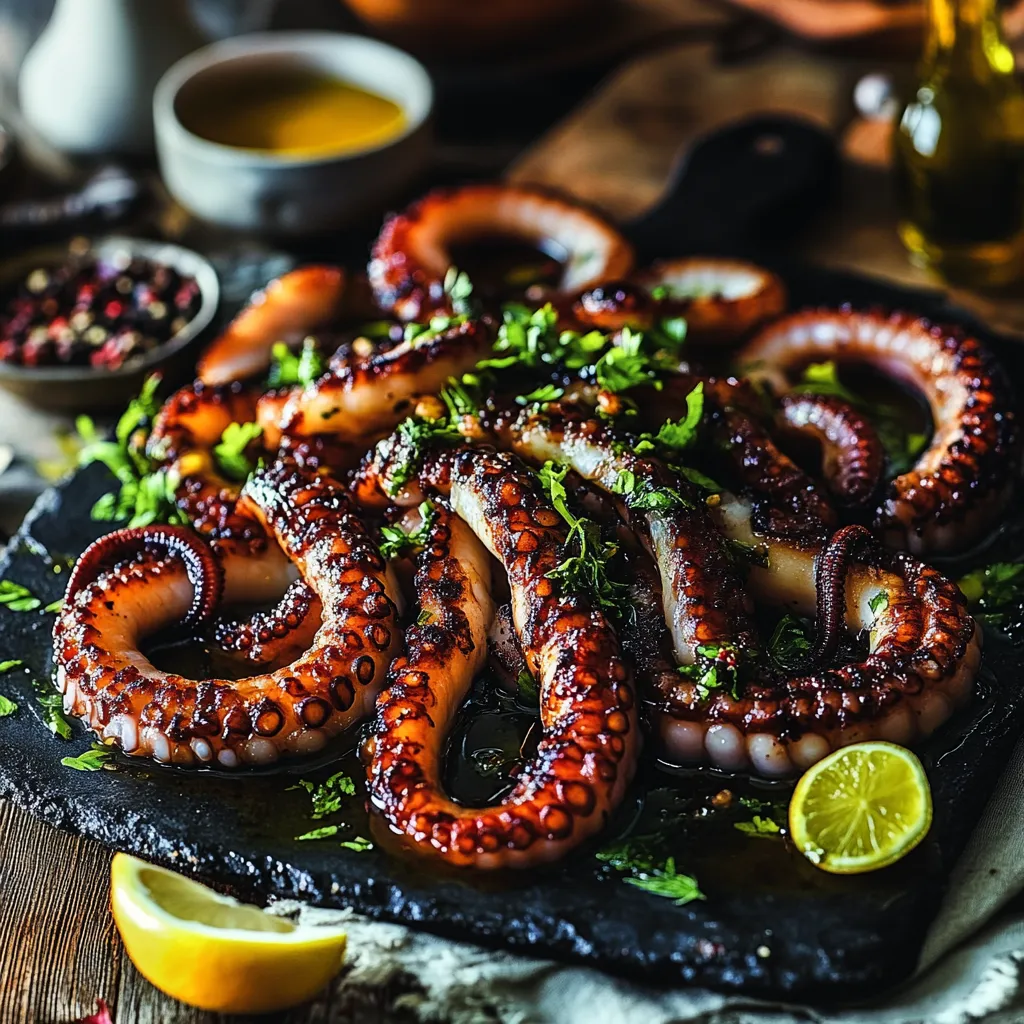 Pin it
Pin it
This hearty Greek-style grilled octopus brings the Mediterranean to your table with its tender texture and smoky char. After mastering this technique during my travels through coastal villages, I've perfected a foolproof method that delivers restaurant-quality results every time.
I first attempted this recipe after returning from the Greek islands where I watched local fishermen prepare their catch. What intimidated me initially has become my signature dish that friends request whenever they visit.
Ingredients
- Fresh or frozen octopus: Ideally between 2 to 3 pounds for perfect tenderness
- Coarse sea salt: Draws out moisture and aids in tenderizing
- Extra virgin olive oil: Preferably Greek for authentic flavor
- Fresh lemon juice: Brightens the natural sweetness of the octopus
- Garlic cloves: Use fresh not pre-minced for best aroma
- Dried oregano: Authentic Greek variety offers more intense flavor
- Black pepper: Freshly ground adds subtle heat
- Bay leaves: Infuse the cooking liquid with herbal notes
- White wine vinegar: Helps tenderize and adds brightness
Step-by-Step Instructions
- Cleaning and Preparing:
- Rinse the octopus thoroughly under cold running water. Remove the beak located in the center of the tentacles by pushing it out from the inside. Check the head cavity and remove any remaining viscera. Pat dry with paper towels. This thorough cleaning ensures no sand or grit remains in your final dish.
- Tenderizing Method:
- Place the octopus in a large pot with enough cold water to cover completely. Add a cork from a wine bottle—this traditional Mediterranean trick helps tenderize the meat. Bring to a boil then reduce to a simmer. Cook for approximately 45 to 60 minutes until a knife easily pierces the thickest part of the tentacle. The octopus will release its own juices creating a natural broth.
- Cooling Phase:
- Remove the octopus from the cooking liquid and allow it to cool completely. This step is crucial as it allows the proteins to set properly ensuring the perfect texture. Once cooled, cut the tentacles from the head and body at the base. The head can be reserved for another use if desired.
- Marinating Process:
- Combine olive oil, garlic, oregano, black pepper, and lemon juice in a large bowl. Add the octopus tentacles and toss to coat completely. Cover and refrigerate for at least 2 hours or preferably overnight. The longer marination results in more developed flavors penetrating deep into the meat.
- Grilling Technique:
- Heat your grill to high, approximately 450°F. Remove the octopus from the marinade allowing excess oil to drip off. Place tentacles directly on the grill grates. Cook for 3 to 4 minutes per side until you achieve beautiful char marks and slightly crispy edges while maintaining the tender interior.
- Final Seasoning:
- Transfer the grilled octopus to a serving platter. Drizzle with additional fresh olive oil. Squeeze fresh lemon juice over the top. Sprinkle with coarse sea salt and a final touch of oregano. Allow the octopus to rest for 5 minutes before serving so the juices redistribute throughout the meat.
 Pin it
Pin it
The wine cork might seem like an old wives' tale but I discovered its effectiveness firsthand. My Greek neighbor Dimitri laughed when he saw me struggling with tough octopus years ago. He handed me a cork from his wine bottle and explained his grandmother never cooked octopus without one. Whether scientifically valid or not I never skip this step now.
Cultural Context
Grilled octopus or "Htapodi sta Karvouna" has been a staple in Greek coastal cuisine for centuries. Fishermen would tenderize freshly caught octopus by pounding it against coastal rocks before cooking. This practice developed from necessity as octopus muscle fibers require breaking down to achieve the desired tenderness. The simplicity of the dish reflects Mediterranean cooking philosophy where quality ingredients prepared simply yield extraordinary results.
Storage Tips
Leftover grilled octopus can be refrigerated in an airtight container for up to 3 days. The flavors actually continue to develop making day two octopus sometimes even better than fresh. For best results, bring refrigerated octopus to room temperature before serving. Freezing is not recommended as it significantly alters the texture creating unpleasant toughness upon thawing.
Serving Suggestions
Serve your grilled octopus as part of a traditional Greek meze platter alongside tzatziki, hummus, and warm pita bread. For a complete meal, pair with a classic Greek salad and lemon roasted potatoes. The octopus can also be roughly chopped and tossed with pasta, olive oil, and fresh herbs for a different presentation. I particularly enjoy serving it on a wooden board with lemon wedges, oregano sprigs, and a small dish of extra virgin olive oil for dipping.
 Pin it
Pin it
This grilled octopus will transport you straight to the Greek coast—perfectly tender and full of flavor, it’s sure to impress!
Frequently Asked Questions
- → How long should octopus be boiled before grilling?
Octopus should be boiled or simmered in salted water for approximately 30 minutes, or until it reaches a fork-tender consistency. This pre-cooking step is essential for breaking down the tough muscle fibers and ensuring a tender final texture after grilling.
- → What ingredients make the best octopus marinade?
A classic octopus marinade includes olive oil, minced garlic, fresh lemon juice, salt, and black pepper. For additional flavor, you can include herbs like oregano, thyme, or bay leaves. Mediterranean variations might add red wine vinegar, while Asian versions could incorporate soy sauce and ginger.
- → How can you tell when grilled octopus is perfectly cooked?
Perfectly grilled octopus should have a charred, crispy exterior while maintaining a tender interior. It typically takes 3-4 minutes per side on high heat. Look for slight charring on the edges and a deep purple-reddish color. The texture should offer some resistance but still be tender enough to cut easily.
- → Can octopus be prepared ahead of time before grilling?
Yes, octopus can be boiled and marinated up to 24 hours in advance. In fact, allowing it to marinate overnight in the refrigerator enhances flavor development. This makes it an excellent make-ahead option for entertaining, with just the final grilling step needed before serving.
- → What are common serving suggestions for grilled octopus?
Grilled octopus pairs beautifully with simple accompaniments that highlight its flavor. Serve it drizzled with quality olive oil and fresh lemon, alongside roasted potatoes, fresh herbs, and a Greek salad. In Spanish-style presentations, it's often served with paprika and garlic. For an elegant appetizer, arrange sliced octopus tentacles over a bed of arugula with cherry tomatoes.
- → How do you select the best octopus for grilling?
When selecting octopus, look for specimens weighing 2-3 pounds with a fresh, oceanic smell. Both fresh and frozen options work well, with frozen often being pre-tenderized. Smaller octopuses tend to be more tender than larger ones. If buying fresh, ensure the skin is shiny and the flesh is firm. For convenience, many chefs prefer cleaned, frozen octopus which offers consistent quality.
